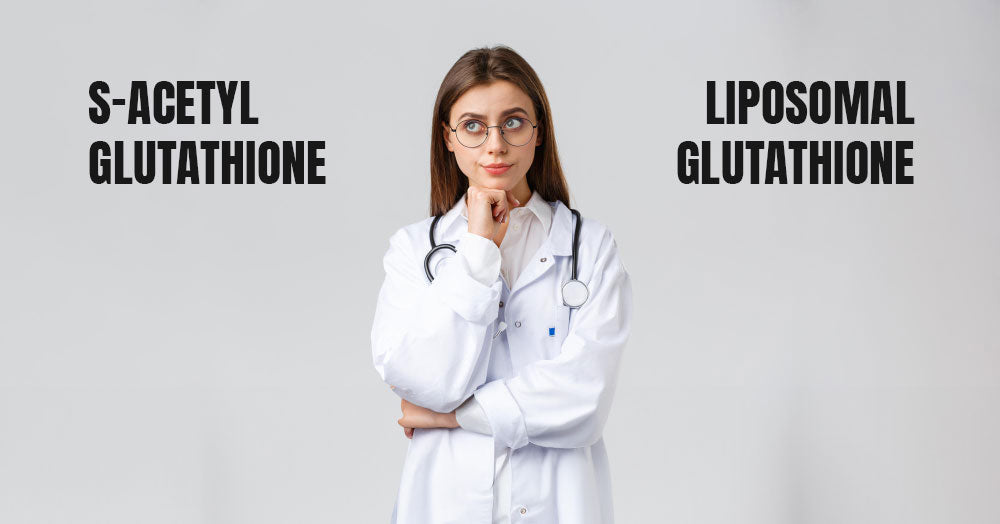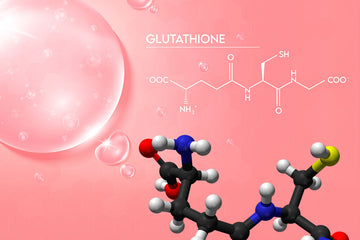

Which is Better: S-Acetyl Glutathione or Liposomal Glutathione?
Table of Contents
When it comes to boosting your body's natural defenses, glutathione is a powerful antioxidant that plays a crucial role. But with so many forms of glutathione supplements available in the market, which one should you choose?
In this post, we will be discussing two popular forms of glutathione supplements - S-Acetyl Glutathione and Liposomal Glutathione. We will delve into the composition, uses, benefits, and potential side effects of both these supplements. We will also compare their efficacy and explore which one is better suited for your individual needs.
So if you're wondering which form of glutathione supplement to choose, keep reading!
Understanding S-Acetyl Glutathione: Its Composition and Uses
S-Acetyl Glutathione, often abbreviated as SAG, is a modified form of the natural antioxidant molecule called glutathione. Glutathione is a tripeptide composed of three amino acids: cysteine, glutamic acid, and glycine. It plays a crucial role in various biological processes, primarily as an antioxidant and detoxifier. However, standard glutathione supplements have limited bioavailability when taken orally, as it gets broken down in the digestive system before it can be absorbed effectively. S-Acetyl Glutathione is developed to address this issue by enhancing its stability and absorption.
Here's a breakdown of S-Acetyl Glutathione:
- Composition: S-Acetyl Glutathione is composed of glutathione molecules attached to an acetyl group. This acetyl group helps protect the glutathione molecule from degradation in the digestive system and allows it to be absorbed more efficiently into the cells.
- Bioavailability: One of the main advantages of S-Acetyl Glutathione is its enhanced bioavailability compared to regular glutathione supplements. The acetyl group protects the molecule from enzymatic breakdown in the gut, ensuring more of it reaches the bloodstream intact.
- Antioxidant Properties: Glutathione, in its various forms, is known for its powerful antioxidant properties. It helps protect cells from oxidative damage caused by free radicals, which can contribute to aging and various health issues.
- Detoxification: Glutathione is a crucial component of the body's detoxification system. It helps in the breakdown and removal of toxins and harmful substances, particularly in the liver.
- Immune Support: Glutathione is also involved in immune system function. It helps modulate the immune response and may support the body's ability to fight infections and illnesses.
- Anti-Aging: Some proponents of S-Acetyl Glutathione suggest that it may have anti-aging effects due to its antioxidant properties. It may help reduce the appearance of age-related skin issues and promote overall health.
- Neuroprotection: There is some evidence to suggest that glutathione, including its S-Acetyl form, may have neuroprotective effects. It could potentially play a role in supporting brain health and reducing the risk of neurodegenerative diseases.
- Usage: S-Acetyl Glutathione is typically available in supplement form, such as capsules or tablets. The recommended dosage can vary depending on individual needs and health conditions, so it's essential to consult a healthcare professional before using it.

Exploring Liposomal Glutathione: How it Works and its Benefits
Liposomal glutathione is a specialized form of the antioxidant glutathione, designed to enhance its absorption and bioavailability in the body. Glutathione is a naturally occurring molecule found in virtually every cell of the body, and it plays a crucial role in various biological processes, particularly in detoxification and the protection of cells from oxidative stress. Here's an overview of how liposomal glutathione works and its potential benefits:
Glutathione Basics:
- Glutathione is a tripeptide composed of three amino acids: cysteine, glutamic acid, and glycine.
- It is a powerful antioxidant that helps neutralize harmful free radicals in the body.
- Glutathione is involved in detoxifying harmful substances, supporting the immune system, and maintaining the health of various organs, including the liver.
Liposomal Delivery:
- The challenge with traditional glutathione supplements is that the molecule is poorly absorbed when taken orally. It gets broken down in the digestive system before it can reach the cells.
- Liposomal technology involves encapsulating glutathione within tiny lipid (fat) vesicles called liposomes. These liposomes protect the glutathione molecules as they pass through the digestive system and allow for better absorption into the bloodstream.
Benefits of Liposomal Glutathione:
- Increased Bioavailability: The liposomal delivery system significantly improves the absorption of glutathione, increasing its bioavailability compared to standard oral supplements.
- Antioxidant Support: Glutathione is a potent antioxidant that helps combat oxidative stress and reduce cellular damage caused by free radicals. This can benefit overall health and may have anti-aging effects.
- Detoxification: Glutathione plays a central role in the detoxification of harmful compounds in the body, including heavy metals and environmental toxins. Liposomal glutathione may support detox processes.
- Immune System Support: Glutathione supports the immune system by enhancing the function of immune cells and promoting the production of antibodies.
- Liver Health: The liver relies on glutathione for detoxification and protection against damage. Liposomal glutathione may benefit individuals with liver conditions or those exposed to liver-damaging substances.
- Skin Health: Some people use liposomal glutathione for skin lightening and to reduce the effects of skin conditions like melasma.
Potential Uses:
- Liposomal glutathione is often used as a dietary supplement for individuals with specific health concerns, including chronic illnesses, liver disorders, or exposure to environmental toxins.
- It may also be used by athletes and fitness enthusiasts to aid in post-workout recovery and reduce oxidative stress caused by intense exercise.

Dosage and Precautions:
- The recommended dosage of liposomal glutathione can vary depending on individual needs and health goals. It's advisable to consult with a healthcare professional for personalized guidance.
- While generally considered safe, individuals with allergies to any of the ingredients in the liposomal formulation or those with specific medical conditions should consult a healthcare provider before use.
What are the Key Differences between S-Acetyl Glutathione vs Liposomal Glutathione?
S-Acetyl Glutathione and Liposomal Glutathione are two different forms of glutathione supplements, each with its own set of characteristics and potential benefits. Here are the key differences between them:
Chemical Structure:
- S-Acetyl Glutathione: S-Acetyl Glutathione is a modified form of glutathione in which an acetyl group is attached to the glutathione molecule. This modification is intended to improve its stability and absorption in the digestive system.
- Liposomal Glutathione: Liposomal Glutathione consists of glutathione molecules encapsulated within liposomes, which are tiny spherical structures made of lipids (fats). These liposomes protect and deliver the glutathione to cells in the body.
Absorption and Bioavailability:
- S-Acetyl Glutathione: S-Acetyl Glutathione is often claimed to have better bioavailability compared to regular glutathione supplements because the acetyl group can enhance its absorption through the intestinal wall. This means more of the S-Acetyl Glutathione may reach the bloodstream intact.
- Liposomal Glutathione: Liposomal Glutathione is also touted for its improved bioavailability. The liposomes can help protect glutathione from degradation in the digestive system and facilitate its absorption in the cells.
Shelf Stability:
- S-Acetyl Glutathione: S-Acetyl Glutathione is typically more stable than regular glutathione supplements and does not require refrigeration for storage.
- Liposomal Glutathione: Liposomal Glutathione, due to its encapsulation in liposomes, is often more stable than regular glutathione but may still benefit from refrigeration to prolong shelf life.
Dosage and Concentration:
- S-Acetyl Glutathione: S-Acetyl Glutathione supplements usually come in a more concentrated form, allowing for smaller doses to achieve the desired glutathione levels.
- Liposomal Glutathione: Liposomal Glutathione supplements may require larger doses because the liposomal delivery system can affect the concentration and absorption of glutathione.
Cost:
- S-Acetyl Glutathione: S-Acetyl Glutathione supplements can be more expensive on a per-dose basis compared to traditional glutathione supplements.
- Liposomal Glutathione: Liposomal Glutathione supplements are also relatively expensive due to the added technology of liposomal encapsulation.
Feature |
S-Acetyl Glutathione |
Liposomal Glutathione |
Form: |
Stabilized glutathione derivative |
Glutathione encapsulated in liposomes |
Bioavailability: |
More bioavailable than oral glutathione, but less bioavailable than liposomal glutathione |
More bioavailable than oral glutathione, but less bioavailable than S-acetyl glutathione |
Absorption: |
Absorbed directly into cells |
Absorbed through the lymphatic system |
Cost: |
More expensive than oral glutathione, but less expensive than liposomal glutathione |
More expensive than oral glutathione and S-acetyl glutathione |
Side effects: |
Generally well-tolerated, but may cause minor side effects such as nausea, diarrhea, and stomach cramps |
Generally well-tolerated, but may cause minor side effects such as allergic reactions and skin irritation |
Let’s Sum Up
In conclusion, both S-Acetyl Glutathione and Liposomal Glutathione have their own unique composition, uses, and benefits. S-Acetyl Glutathione is known for its ability to cross the blood-brain barrier and support brain health, while Liposomal Glutathione is praised for its enhanced absorption and bioavailability.
When it comes to choosing between the two, it ultimately depends on your specific health needs and preferences. It is always recommended to consult with a healthcare professional before incorporating any new supplements into your routine. Remember, the goal is to find a high-quality glutathione supplement that best suits your individual requirements and supports your overall health and wellness.




















